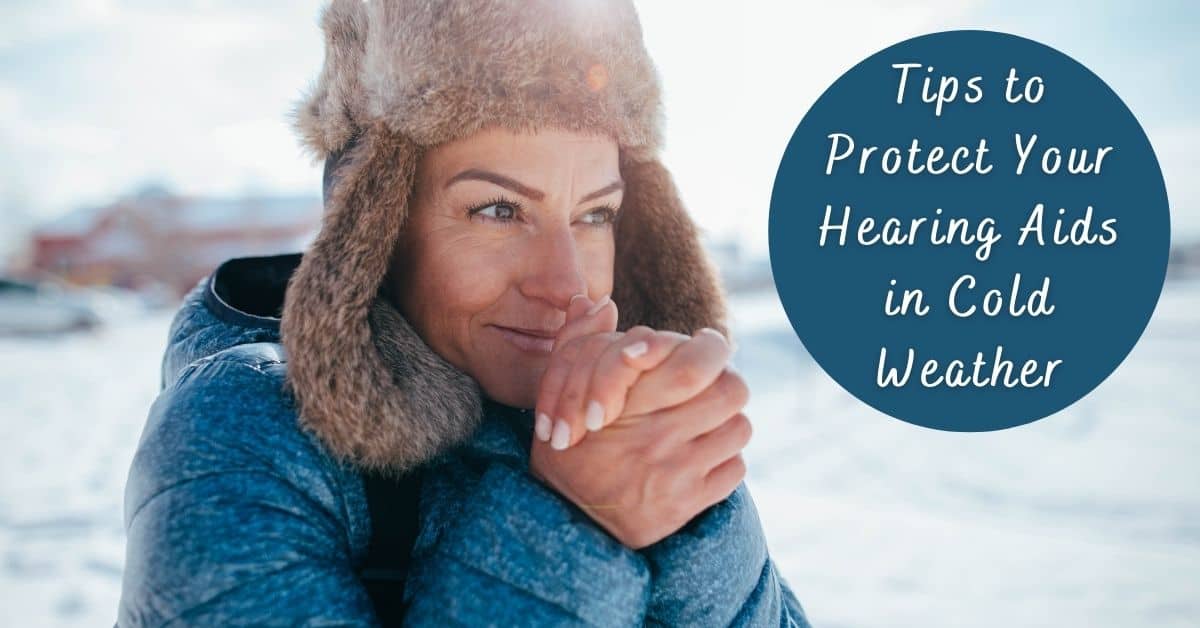Cold weather can make our fingers and toes numb. Cold weather can also damage your hearing aids. That’s why it’s so important to protect your hearing aids in cold weather. These are a few tips for when the weather gets cold.
How Does Cold Weather Damage Hearing Aids?
Cold weather can damage your hearing aids. It’s not usually the cold temperature that damages your hearing aids, but the moisture and condensation that can quickly build up on your devices.
When you move from the cold outside into the warm inside the house, your glasses fog up. This is the condensation that forms when you move quickly between temperatures. This moisture is what can damage your hearing aids in cold weather.
How Does Cold Weather Affect Your Ears?
Cold weather can damage your hearing aids, and it might also affect your ears. If you have tinnitus, you may notice that it’s more noticeable in cold weather. The cold air can sometimes trigger tinnitus, that ringing or buzzing sound in your ears. No one knows exactly why tinnitus is more common in the winter, but if you’re experiencing more tinnitus in the winter months, you’re not alone.
Cold weather can also lead to clogged ears. Have you experienced the feeling that your ears are stuffy or blocked? Changes in the air pressure in the wintertime can lead to this feeling in the ear.
Do Your Hearing Aids Have Moisture Damage?
During the winter months, check your hearing aids regularly for any signs of moisture damage. Moisture can build up on the hearing aids and damage the microphone, the receiver, or even the hearing aid batteries. Some of the signs of moisture damage include:
- Sound distortions
- The sound cutting in and out
- Static noise coming through your hearing aids
- Your hearing aids stop working for a while, then start again.
These are some common signs of moisture damage and the issues may come and go. This can happen because the sound quality will decrease when the hearing aid is wet, and then return to normal when the hearing aid dries out.
Clean and Dry Your Hearing Aids Every Day
One of the best ways to protect your hearing aids from cold weather is to clean and thoroughly dry your hearing aids every day. Start by wiping your hearing aids with a clean, dry cloth. Open the battery door and dry the battery contacts. If you notice any buildup of earwax or dirt on your devices, you can clean it with a hearing aid pick.
To get your hearing aids completely dry, it’s a good idea to use a hearing aids drier. They’re very easy to use. All you have to do is set your hearing aids in the drier after you’ve cleaned them. Leave them in the dryer overnight, and in the morning your hearing aids will be completely dry, and safe from any moisture or condensation.
How to Protect Your Hearing Aids During Cold Weather
Along with cleaning your hearing devices every day, you can keep your hearing aids dry during the colder months.
Earmuffs: One way to protect your hearing aids is with earmuffs. They’ll keep your ears warm, and they’ll also help keep your hearing aids dry when you’re outside.
Sweatbands: Another option to keep your hearing devices dry is to wear hearing aid sweatbands. These come in handy if you’re participating in winter sports, or working up a sweat during the cold weather. Sweatbands slip over your ears and catch moisture and perspiration before they reach your hearing aids.
Use an umbrella: You can also use everyday items to keep your hearing aids dry. If you’re going out in the snow or the rain, use an umbrella or wear a coat with a hood to keep your ears and your hearing aids dry.
Hearing Aid Maintenance and Care
Have you noticed any difficulty hearing, or been having problems with your hearing aids? Visit us for all your hearing needs. We’ll help you with hearing aid maintenance and repairs, and give you more tips on how to protect your hearing aids in cold weather. We’ll also help you find the right hearing aid dryer to keep your hearing aids dry this winter.


